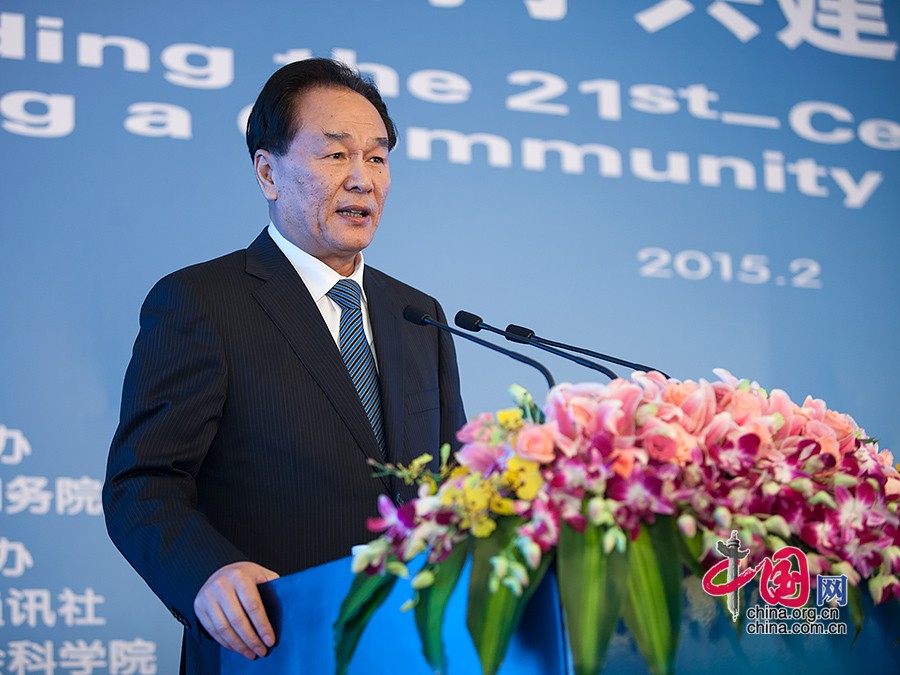Speech by Cai Mingzhao
 0 Comment(s)
0 Comment(s) Print
Print E-mail China.org.cn, February 9, 2015
E-mail China.org.cn, February 9, 2015
|
|
|
Cai Mingzhao,President of Xinhua News Agency, delivers a speech at the opening ceremony of the International Seminar on the 21st-Century Maritime Silk Road Initiative in Quanzhou City, Fujian Province, on Feb. 11, 2015. [Photo:China.org.cn] |
The following is the full text of Cai Mingzhao's speech titled "Building the Maritime Silk Road, Renewing Friendship."
Ladies and Gentlemen, dear friends,
It's a great pleasure for me to be here in Quanzhou and to explore ways of building the maritime Silk Road in the 21st century with my friends from China and abroad. On behalf of Xinhua News Agency, one of the co-sponsors of the seminar, I would like to express my respect and gratitude to all the participants, and to the Chinese and international journalists who are covering the event.
In the fall of 2013, Chinese President Xi Jinping proposed the building of the Silk Road Economic Belt and the 21st Century Maritime Silk Road. The "Belt and Road" initiative has been widely applauded and supported by countries along the route, because it conforms to these countries' aspiration to accelerate development and their people's common desire for better lives. After the "Belt and Road" initiative was put forward, many countries have mapped out relevant policies to implement bilateral and multilateral projects and to deepen people-to-people exchanges. This has injected a new vitality into the ancient Silk Road both on land and at sea.
Quanzhou, the starting point of the world-renowned Maritime Silk Road, has witnessed many stories of amity between the Chinese people and their friends from across the ocean. More than 700 years ago, Italian traveler Marco Polo, having toured around China for 17 years, set out from Quanzhou and traveled along the Maritime Silk Road back to his hometown Venice. In his travelogue, Marco Polo told the world about China and Quanzhou. In another five decades, Moroccan traveler Ibn Battuta traveled along the maritime Silk Road to Quanzhou, where he received a warm welcome and befriended many Chinese people. In yet another five decades, Chinese navigator Zheng He launched seven voyages, thus launching a massive naval expedition marking peace and friendship. Quanzhou was a major stopping-off point in Zheng's expeditions. After Zheng He's fleet arrived at the Sulu Archipelago of the Philippines, Bai Pixian, a sailor from Quanzhou, chose to stay and became the first Chinese settler in Sulu because he had fallen in love with a Moro girl there.
These stories, of famous travelers and ordinary sailors alike, show that the ancient maritime silk road was shaped by people from different countries along the route. The maritime silk road, since ancient times, is a link of commerce and trade, cultural exchanges and friendly cooperation. People from all countries along the route have stood together through thick and thin. Together, they promoted regional economic growth and social progress, and formed the essence of the long-lasting "Silk Road Spirit", which features peaceful cooperation, open-mindedness, tolerance, mutuality and common prosperity.
Ladies and gentlemen, dear friends,
Against the backdrop of economic globalization and regional integration, the world has become a global village and all countries along the Maritime Silk Road are in the same boat, sharing common interest and responsibilities. China pursues peaceful development through cooperation and aims for common prosperity. It is striving for other countries along the Maritime Silk Road to benefit from China's development, and likewise, for China to gain momentum in the common development of all countries along the route. The building of the 21st century maritime Silk Road will prove that China's development brings about opportunities to the world, and the prosperity of other countries on the route will become new opportunities for China too.
The 21st century maritime Silk Road carries the common aspiration of the Chinese and people from all countries along the route. Its building calls for concerted efforts from all these countries and their people. The media, as a means of information dissemination and a courier for cultural exchanges, plays an irreplaceable role in enhancing mutual understanding and friendship among people from different countries. The media should faithfully record, and actively participate in the building of the 21st century maritime Silk Road, promote mutual recognition and understanding among people from different countries, enhance their friendship and encourage sharing of information and other resources. As China's state news agency, Xinhua is determined to focus on the following three aspects to boost the building of the Maritime Silk Road.





Go to Forum >>0 Comment(s)